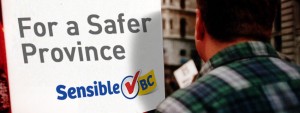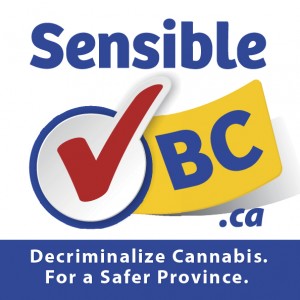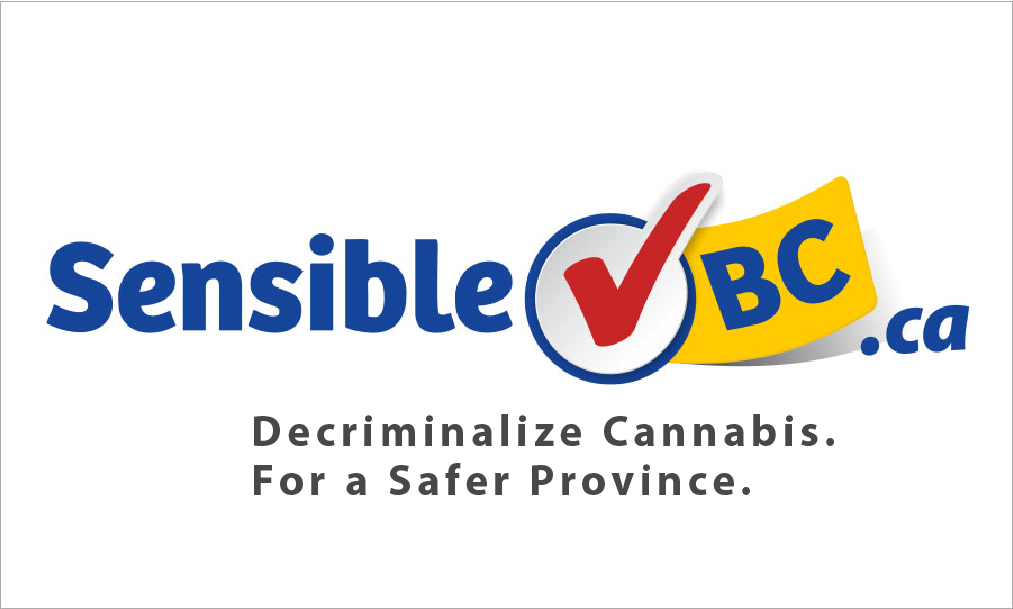Campaign has little time to make big waves
By Andrew Brown
Canvassers are out in full stride, diligently collecting signatures to force the B.C. government into a referendum to pass the Sensible Policing Act. Since Sept. 9, the first day official signature collection began, over 100 local organizers and over 3000 volunteers have now stepped up to help collect signatures from ten percent of voters in each riding. The campaign has 90 days to pull off the initiative, meaning Dec. 5 is the final day to get signatures in. Have you signed yet?
While canvassers have been met with the odd heckler or Anslinger/Reagan-esque propaganda-spewing stalemate, the support from the general public has been overwhelming—people want to sign, but we need to reach them. People from all walks of life have signed, including police officers, MLAs, and Members of Parliament.
Why should you sign? The war on drugs has been a failure. The federal Conservative government will not shift from their ideological stance, so as a province the best measure that can realistically be achieved is to pass the Sensible Policing Act. Sensible BC is “calling upon the B.C. government to pass the Sensible Policing Act, which will redirect all police in the province from making searches, seizures or arrests in cases of simple cannabis possession,” as they state on their website <SensibleBC.ca> The Sensible Policing Act calls for the setup of “a public commission to figure out the best path toward a legally regulated and taxed cannabis system in B.C.” It will also allow for police to deal with impaired driving and youth possession in a way similar to the way they treat alcohol offences.
It has been about a year since Dana Larsen and his crew began tirelessly working to make voters aware of the upcoming campaign, through a tour of communities across the province, media attention, social media, and public events, among seemingly endless other ways. A pre-registration form was created to help locate people wanting to sign and find volunteers. While this strategy was effective in many ways, during the official collection of signatures some people are unsure if they have signed the actual petition or the pre-registration, leading to some confusion. It is important that people not sign twice, as their signature will not count, so canvassers need to do their best to help signers determine whether they signed before Sept. 9 when the official collection began.
The “Canna-Bus,” the campaign’s bus, is currently on the road, traveling throughout the province and bringing more attention to the initiative. This full-size bus is decked out in campaign colours and is essentially a mobile billboard. Look for it in your town or city and show your support, or better yet, sign.
 Recently, some canvassers in Burnaby, Richmond, and Surrey were tossed out of SkyTrain stations. Collecting signatures for a provincial ballot initiative in a public space is an activity protected by the Canadian Charter of Rights and Freedoms. On Sept. 27, a formal complaint was filed with TransLink regarding the harassment by transit police, and the TransLink spokesperson assured that canvassers would not be blocked in any way from petitioning or collecting signatures. Despite this, two canvassers, Bruce Myers and Pierre Groulx, were pressured to leave the Surrey SkyTrain station by TransLink staff and the RCMP twice since that statement was made. Sensible BC does provide canvassers with a handout to show individuals trying to force them out of a public location, clearly stating and referencing the law allowing signature collection. In 1991, The Supreme Court of Canada also confirmed the right to solicit signatures in any public place when finding that Section 2 of the Charter was infringed when political speech was restricted at an airport.
Recently, some canvassers in Burnaby, Richmond, and Surrey were tossed out of SkyTrain stations. Collecting signatures for a provincial ballot initiative in a public space is an activity protected by the Canadian Charter of Rights and Freedoms. On Sept. 27, a formal complaint was filed with TransLink regarding the harassment by transit police, and the TransLink spokesperson assured that canvassers would not be blocked in any way from petitioning or collecting signatures. Despite this, two canvassers, Bruce Myers and Pierre Groulx, were pressured to leave the Surrey SkyTrain station by TransLink staff and the RCMP twice since that statement was made. Sensible BC does provide canvassers with a handout to show individuals trying to force them out of a public location, clearly stating and referencing the law allowing signature collection. In 1991, The Supreme Court of Canada also confirmed the right to solicit signatures in any public place when finding that Section 2 of the Charter was infringed when political speech was restricted at an airport.
Cowichan organizer Steve LeSage has also had some difficulty exercising his lawful rights by not being allowed to collect signatures at the Duncan Farmer’s Market on Saturday mornings. While this is a setback, it has not deterred him from spending every day holding the clipboard all throughout the Duncan area. LeSage says the experience of being an organizer has been exhausting but rewarding, with the connections he has made and the number of people he has met. He is also quick to point out the achievements of other activists and canvassers, such as Barb Kohlman, who stepped up last minute as an organizer to fill in the gap in Nanaimo-N. Cowichan; and Amanda Orum, the Nanaimo or
ganizer who was able to get the signatures of MLAs and MPs and the support of NDP leader Thomas Mulcaire.
An interesting personal encounter I had recently was with a fellow on his way to an environmental film festival, who stopped by to sign. He said that he firmly opposed the smoking of cannabis, but was signing because there are far more pressing issues to address (gesturing toward the film festival) and he was tired of watching so many resources being funneled toward fighting against cannabis while humanity is at risk due to pollution and climate change. The public is clearly tired of the war on drugs.
It is common to find people wanting to sign but uneasy about signing an official form that may put them on a list. We are participating in real democracy to make change, and it says a lot about the so-called democratic society in Canada if people are afraid to put their name on a petition to make a change that they support. With the recent exposure of the true scope of government spying and data collection, it is safe to assume that if you are afraid to be on a list, there is a good chance you are already on a list. The government is elected to enact the will of the people, and it is important we hold them to that.
With the introduction of mandatory minimum sentences for drug crimes by the Conservative government, and changes to the system to access medical cannabis, we could see many legitimate medical cannabis users, facing harsh penalties due to access or affordability issues forcing them to break laws. With the ethical issue of criminalizing recreational use of a substance with a fraction of the potential health risks of alcohol, and the continually increasing cost of enforcing cannabis laws, the Sensible Policing Act would be a welcome change. Last year, a financial burden of $10.5 million was placed on B.C. taxpayers to simply detain, charge, and convict cannabis users. This figure does not include court and police costs of pursuing dealers and growers. Since 2005, the cost has doubled, and is sure to increase as the true cost of mandatory minimum sentencing begins to be felt. All of this in spite of public opinion, according to all recent polls, clearly wanting an end to marijuana prohibition.
We have 90 days to collect 400 thousand signatures, with Dec. 5 being the final day. While decriminalization isn’t the best option, on a provincial level it is the best we can do. The campaign needs your support. Whether you can donate time or a little bit of money, it is all appreciated. For more info, or contacts for local organizers, visit <SensibleBC.ca>




